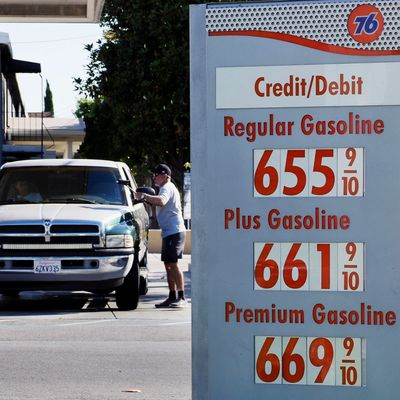
It turned out things could get worse. June has been the steepest month yet in this long, difficult season of inflation, with prices not only notching a new Biden-era record in a string of them, but hitting the highest peak in 41 years, according to the data from the federal government released on Wednesday. The Consumer Price Index, which measures the price of goods, rose 9.1 percent over the last year, with gas hitting new highs and taking just about everything else with it. Even with gas prices already falling this month, it is far too early to call this as the peak — and with a possible recession looming, and the Federal Reserve hell-bent on hiking interest rates to kill off demand, whatever relief that may come may not feel very good at all.
Arguably the largest fact in this economic mess is the high price of oil (and, by extension, gasoline). Gas rose by 8.2 percent during the past year, the biggest increase in almost 18 years. With the war in Ukraine snarling the world’s supply, and U.S. refinery capacity down, prices for energy peaked during the start of the summer driving season. For anyone who’s pulled into a ExxonMobil station any time since the spring, this isn’t news — and it might be tempting to think that the recent fall in prices at the pump might mean that inflation has essentially peaked. Maybe. “We’re not out of the woods by any stretch of the imagination,” Patrick De Haan, analyst at Gas Buddy, told me. “Right now, the factors are moving in the favor of lower prices that could change abruptly if we get some bad data from the Energy Information Administration, or if there’s a major hurricane that shuts down capacity, or if China changes its COVID Zero policy to boost demand.” The problem with gas is that it’s something beyond the control of any one country or institution, and very few things going on in the world — not war, or new COVID variants, or a slowdown in trade — are making the price of it less volatile. And anyway, prices are falling in the global markets because traders are predicting a recession.
But it’s not all gasoline, and this is where things get a little hairy. There’s another index that the Fed pays attention to, the so-called “core CPI,” which takes out energy and food prices. That index, which is largely shelter and services, is up 5.9 percent for the year — lower than the peak in April, but still high. Central to that is housing costs. In a note from Comerica’s Chief Economist, Bill Adams said that shelter costs were getting passed along from the insane market run-up. But landlords also factor in the price of building materials and gas, as well as what they think they can squeeze tenants for. The price of core services also rose — but the biggest jump was from transportation, which has a tie to the price of gas, which shows how integral oil is to even the farthest reaches of the economy.
There are some bright spots. The price of meat and poultry actually fell in June — something surely noticed by the July 4 grill-masters of America. Airfare and hotels did, too, even though that already feels like stale data. The important thing to keep in mind, though, is what’s next, and how the central bank is going to act. Last month, after the Fed raised interest rates by 0.75 percent — the biggest boost since 1994 — Chair Jerome Powell laid out the case that it could be years before inflation has been tamped down to an acceptable level. Fed officials have been telegraphing that another such hike is likely for their meeting on July 27. On CNBC this morning, Jim Cramer called for an even bigger hike of a full percentage point. (There’s no August meeting scheduled — though they can do an emergency meeting if they want — which can arguably warrant a larger increase.) The markets now think that there’s an 80 percent chance that they’ll hike by 0.75 percent in September as well. All this ratcheting up of borrowing costs is supposed to bring prices down, cool off hiring, and slow down demand. So far, it isn’t exactly working. And this is why, even if inflation levels off, the economy is still going to be in a relatively restrictive place, with the cost of everything from credit-card debt to mortgages and car loans sucking up more of people’s pay.






























